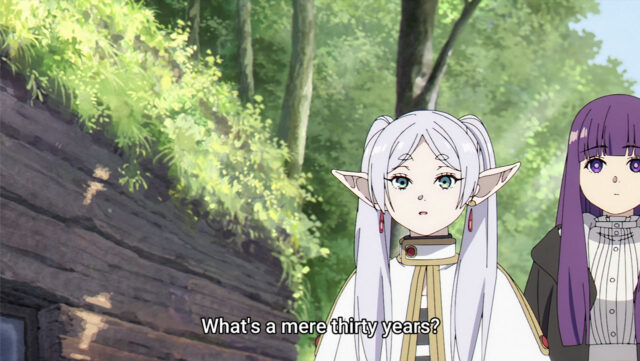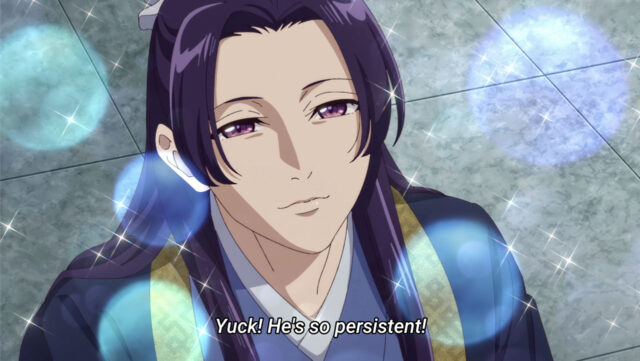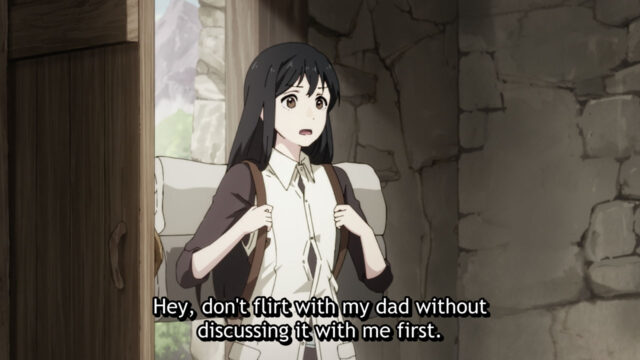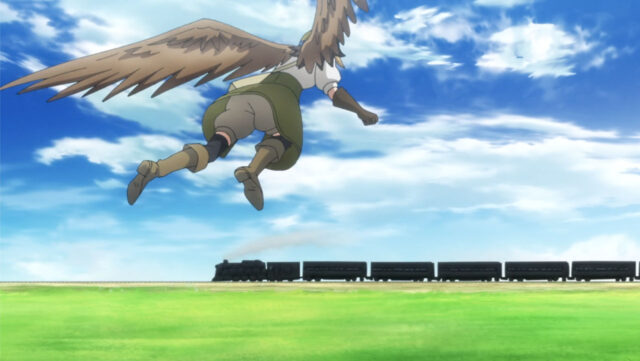I’m currently following not just one, or two, or three, but four different shows, and will probably watch them through the end of the fall season. This hasn’t happened in a long time, probably not since anime’s annus mirabilis 20071.
Frieren: Beyond Journey’s End is the most interesting of the quartet. The title character is an elf mage who years ago was part of a band of heroes who defeated the demon king. She’s short and looks quite young, but she is actually at least a thousand years old. She doesn’t age and has little sense of time passing. At one point she spends six months looking for a particular flower. For her human companion, that’s half a year of her life; for Frieren it’s no more than a single afternoon.
Frieren acquires two youthful companions, an apprentice mage and a fighter. They travel a lot. There doesn’t seem to be an overriding story developing beyond cool, reserved Frieren taking more of an interest in human beings (scenes early in the series which show Frieren in tears seem glaringly out of character) and her charges gradually maturing. It looks like demons will be constant nuisances throughout the show, which could get tedious. As long as the emphasis is on character rather than action, Frieren promises to be very good.
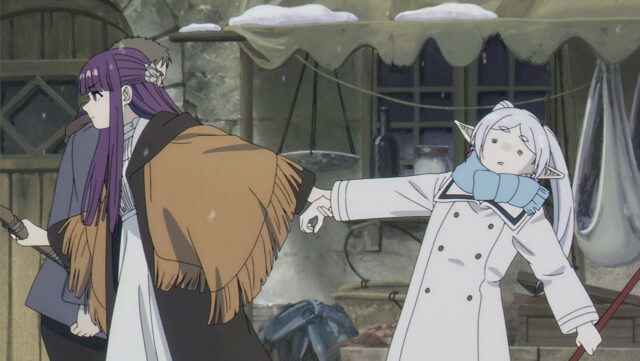
Incidentally, at Pixiv, fan art of the series is tagged “Frieren at the Funeral.” The Japanese title evidently has more than one interpretation. See the discussion here.2
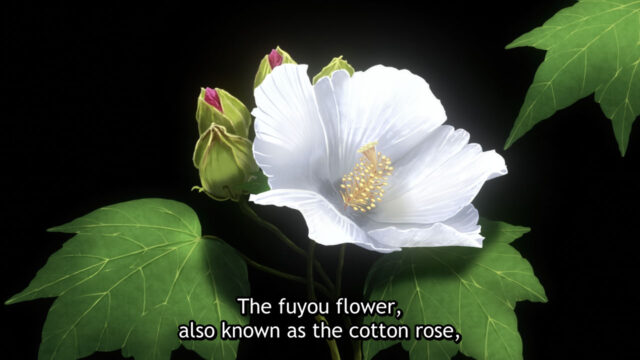
The Apothecary Diaries is yet another series set in the decadent Chinese court where everyone dresses in flowing robes, half the males are eunuchs, intrigue is omnipresent, and the men are prettier than the women.3 Maomao is a pharmacist in a red-light district. She’s literate, practical, has a good working knowledge of herbalism, medicine, poisons and human nature, and has a variable number of freckles across the bridge of her nose. A moment of carelessness results in her being kidnapped and set to work in the court laundry. Despite her best efforts to remain anonymous, her abilities are discovered, she gains new responsibilities (with concomitant risks), and a certain member of the court makes her uncomfortable with his attentions.
Cynical Maomao is smarter than everyone else, and there is a danger that she will become insufferable as she unravels further mysteries. Thus far she has been a sympathetic character. I hope the writers keep her likable.
My Daughter Left the Nest and Returned an S-Rank Adventurer is another damned RPG-inspired show with stupidly long title. It’s been watchable so far because the emphasis has been on the father-daughter relationship rather than monster battles. As long as it’s about Angeline becoming a responsible adult with her father’s guidance, I’ll keep watching, but if it degenerates into constant fighting, I’ll drop it.4
Incidently, when I see the name “Turnera,” this is what I think of.
I’m afraid that Helck is not one of Tatsuo Sato’s outstanding series. It’s still pretty good, but I can only recommend it with reservations. The first half of the second season was an extended flashback explaining why the Hero threw in his lot with demonkind. There’s a strong element of “humans are the real monsters” (I expect that will be qualified somewhat by further revelations), a theme I am just a wee bit cool to. There are a lot of little things are aren’t quite right, from the inseparably paired moons in the sky to the steam locomotive in this non-industrial world. Now that the endless grim flashback is over, there should be a partial return of the humor of the early episodes (though I hope not Helck’s Heroic Laugh, which gets annoying).
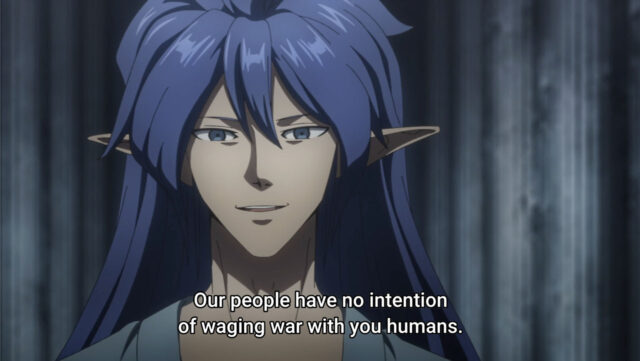
Frieren and Helck offer a study in contrasting demonologies. In the former, demons are purely evil and murderous. Everything they say is meant to deceive, and the only way to deal with them is to kill them. Period. In the latter, they’re just regular folk who look different. They want to live in peace, but, gosh, those darn humans screw everything up. So says Azudra, one of the four demon bigshots when he meets Helck. In the first season, Azudra is presented as a bit of a goofball but fundamentally decent. I detect in Helck a certain amount of Social Commentary, which is one of the reasons it is second-rate Sato.
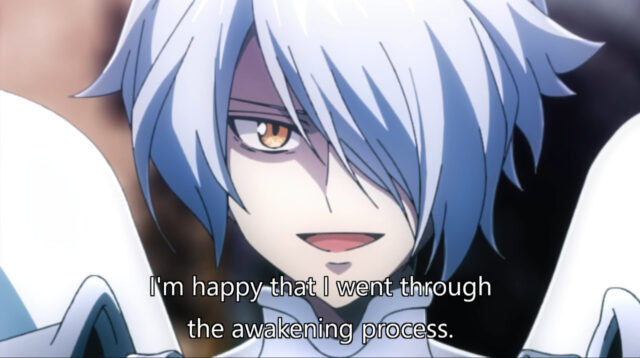
An annoyance with all four of these: the subtitlers frequently leave long speeches untranslated, telling just enough for the viewer to follow the story. I really would like to know what the characters actually say, even if it makes watching the show an exercise in speed reading. There is such a thing as a “pause” button, after all, and I know how to use it.
Notes
- Dennou Coil, Seirei no Moribito, Tengen Toppa Gurren Lagann, Oh! Edo Rocket, Baccano, Mononoke, etc.
- The ubiquitous Takehito Koyasu appears in the most recent episode as an elf monk named “Kraft.” This is not the first Kraft he has played. He chewed the scenery earlier as “Captain Kraft” in Level E.
- E.g. Saiunkoku Monogatari, Raven of the Inner Palace and Psychic Princess. I only lasted a few episodes of Saiunkoku, despite Houko Kuwashima as the lead. The melodramatic Raven isn’t bad, and I need to write about it sometime. It reminds me of some ways of Un-Go. Princess, although energetic and often fun, is too silly to recommend. It’s a Chinese production; if you wonder how different languages sound, you can compare its gooey Chinese with the crisp Japanese of anime.
- I’ll also drop it if Ange continues doing clueless things like playing matchmaker for her father.

